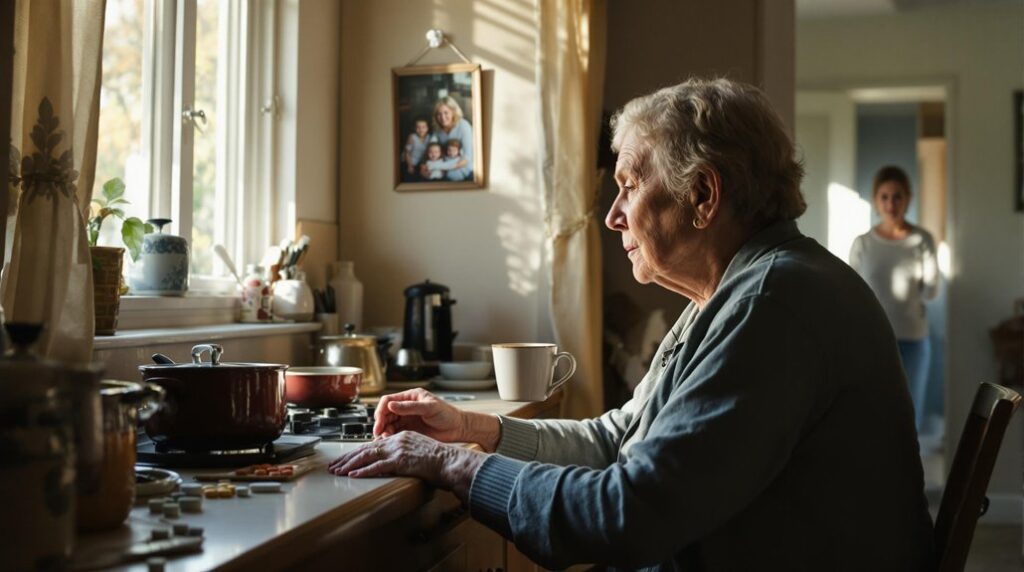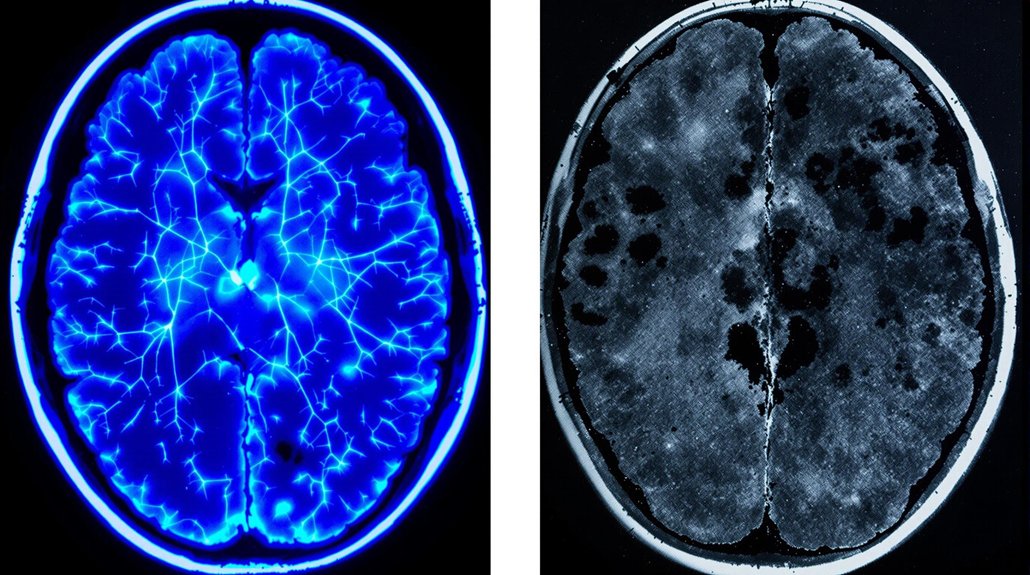You’ll know it’s time to contemplate a care facility when your loved one’s safety is at risk, they struggle with daily tasks like hygiene and meals, or their medical needs become too complex for home care. Watch for signs like wandering, forgetting medications, or leaving appliances on. When caregiver burnout sets in and family stress increases, professional care offers peace of mind and expert support. Understanding all the factors can help you make this challenging decision.
Safety Risks and Concerns at Home
Living with a dementia patient at home becomes increasingly dangerous as their condition progresses.
You’ll need to evaluate multiple safety risks that can threaten your loved one’s wellbeing. Common hazards include wandering outside, leaving stoves unattended, falling on stairs, or mishandling medications.
Even with extensive home modifications like security locks, motion sensors, and grab bars, you can’t eliminate every risk. Your loved one may resist these changes or find ways around safety measures.
Emergency preparedness becomes vital – you’ll need plans for medical emergencies, natural disasters, and wandering incidents.
Watch for warning signs that home care isn’t working: frequent accidents, inability to respond during emergencies, or aggressive behaviors that put both of you at risk.
When safety concerns outweigh the benefits of home care, it’s time to evaluate residential facilities.
Professional dementia-certified caregivers can provide 24/7 supervision and implement fall prevention techniques to maintain safety at home.
Changes in Personal Care and Daily Living Skills
Beyond physical safety concerns, daily self-care abilities often deteriorate as dementia progresses.
You’ll notice your loved one struggling more with personal hygiene and basic daily routines that were once second nature. When these changes become pronounced, it’s important to evaluate if home care can still meet their growing needs.
- Difficulty maintaining regular showering or bathing habits
- Forgetting to change clothes or wearing inappropriate clothing for the weather
- Struggling with tooth brushing, grooming, and other hygiene tasks
- Unable to prepare meals or follow familiar recipes
- Problems managing medications and following prescribed schedules
Watch for signs that your loved one needs increasing help with these activities.
If you’re providing care, consider whether you can sustainably meet these expanding personal care demands while maintaining their dignity and quality of life.
Daily Living Assistance from trained memory care professionals can help manage these essential personal care tasks while preserving dignity.
Caregiver Stress and Family Impact
While caring for a loved one with dementia can be deeply rewarding, it often takes a severe toll on the caregiver’s physical and emotional wellbeing.
You’ll notice signs of caregiver burnout when you’re constantly exhausted, anxious, or experiencing health problems of your own. These symptoms shouldn’t be ignored, as they can lead to depression and compromised immunity.
The impact extends beyond the primary caregiver, affecting entire family dynamics.
Caring for someone with dementia ripples through the family, reshaping relationships and roles as everyone adapts to new realities.
You might see increased tension between siblings over care decisions, financial strain from medical expenses, and relationships becoming strained as your attention focuses primarily on your loved one’s needs.
When you’re spending most of your time caregiving, you’ll have less energy for your spouse, children, or other responsibilities.
Respite care services can provide essential relief for exhausted family caregivers who need a temporary break from their caregiving duties.
Recognizing these challenges is vital in determining if professional care might be the best option.
Medical Needs and Professional Care Requirements
As dementia progresses, your loved one’s medical needs become increasingly complex and demanding.
Professional care facilities offer round-the-clock medical supervision and specialized therapies that you mightn’t be able to provide at home. They’re equipped to handle medical assessments, medication management, and emergency situations that require immediate attention.
- Registered nurses monitor crucial signs and coordinate with doctors for ongoing care adjustments
- Physical therapists help maintain mobility and prevent muscle deterioration
- Occupational therapists assist with daily living activities and cognitive exercises
- Speech therapists address communication challenges and swallowing difficulties
- Mental health professionals manage behavioral symptoms and anxiety
When your loved one needs this level of specialized medical care, a professional facility can provide the all-encompassing support system that guarantees their safety, comfort, and appropriate treatment.
You’ll have peace of mind knowing they’re receiving expert care tailored to their condition.
Alternatively, skilled home care services can provide licensed professionals who deliver medically necessary care within the comfort of your loved one’s home.
Evaluating Care Facility Options and Making the Transition
Selecting the right care facility for your loved one with dementia requires careful research and thoughtful consideration. Start by touring multiple facilities and evaluating their facility amenities, staff-to-resident ratios, and specialized memory care programs. Pay attention to cleanliness, safety features, and the overall atmosphere.
Once you’ve chosen a facility, work closely with staff to develop a change plan. You’ll need to prepare your loved one’s room with familiar items and photographs to create a comforting environment.
Consider arranging for hospice care services to provide additional emotional and physical support during this transition. Schedule visits during different times of day to observe care routines and engage with staff. Remember to provide emotional support to your family member throughout this process. Stay involved in their care plan, maintain regular communication with staff, and participate in family support groups to help you navigate this challenging change.
Conclusion
Nearly half of dementia patients need nursing home care by age 80. You’ll know it’s time when you notice clear warning signs – like your loved one wandering off, forgetting to turn off the stove, or struggling with daily tasks like bathing and dressing. Think of it like a caring lighthouse, guiding you toward safer shores when the waters get too rough to navigate alone.
Listen to your heart – if you’re losing sleep worrying about falls or accidents, or if your own health is starting to suffer, it’s okay to ask for help. Moving to a care facility isn’t giving up – it’s like opening a new chapter where your loved one can get the around-the-clock care they deserve, while you can return to being their daughter, son, or spouse instead of their full-time caregiver.
You’re not alone on this journey. Many families face these same difficult decisions every day. Focus Family Care understands what you’re going through and can help you find the right path forward.
If you or a loved one need help, don’t wait. Reach out to Focus Family Care today at (561) 693-1311 or email us at info@focusfamilycare.com.





